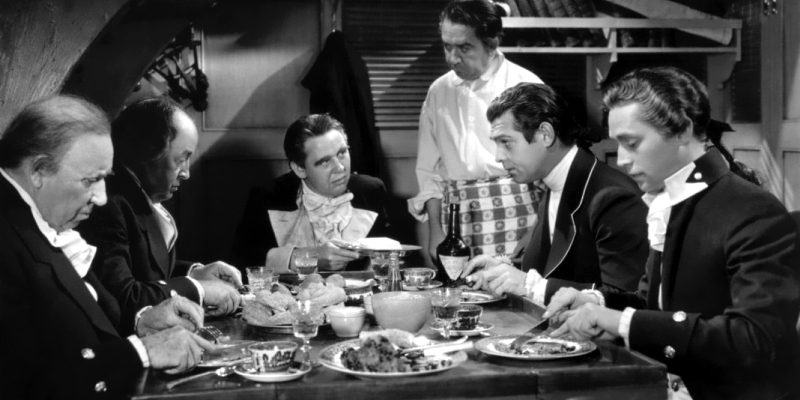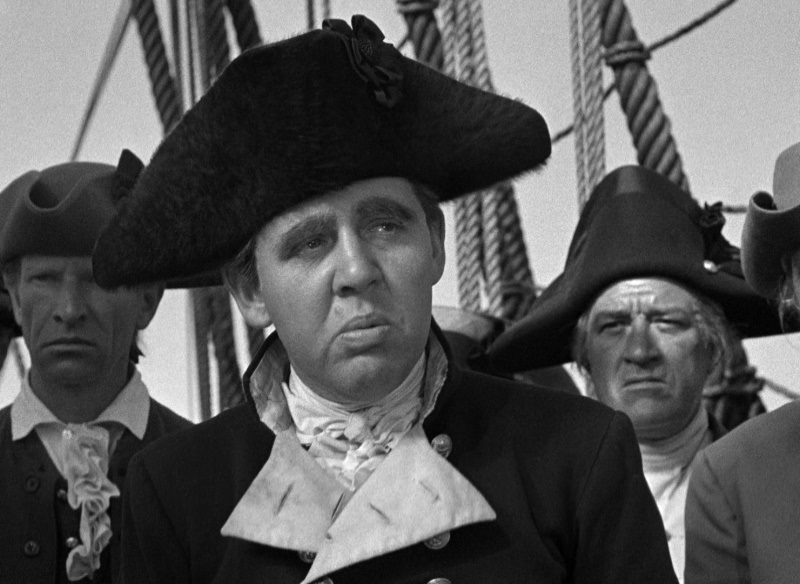Best Picture: Mutiny on the Bounty
The Other Nominees: Les Miserables; Alice Adams; Naughty Marietta; Ruggles of Red Gap; David Copperfield; Broadway Melody of 1936; A Midsummer Night’s Dream; The Lives of a Bengal Lancer; Captain Blood; The Informer; Top Hat
A man has been convicted of striking his commanding officer. As punishment, he is ferried between departing ships, receiving two dozen lashes at each one. When he arrives at the Bounty, he is dead. But Captain Bligh does not believe in mercy for convicted men, and instructs his boatswain, Mr. Morrison, to give the dead man his lashes. It’s a hideous spectacle, shockingly dark and nihilistic for a film this old. And it establishes the villain of the film brilliantly and economically. “Villain” might be too neat a word choice; Bligh’s actions could be seen as over the top and too monstrous to be believed. But Frank Lloyd’s Mutiny on the Bounty has history on its side; Captain Bligh was a real person, and everything depicted in the film actually happened.
Bounty doesn’t try to romanticize the life of a sailor in 1787. An early scene shows men relaxing in a pub, when a woman screams, “Press gang!” Soon all of the men – including one who begs to stay with his wife and child – are pressed into service aboard the Bounty, alongside criminals serving their jail time working on the ship. The ship’s mission is no more noble than this, either; they have orders to sail from Portsmouth to Tahiti in order to bring back breadfruit trees, which make for a cheap, bountiful source of food for slaves.
The ship isn’t manned completely by lowlifes, though. We also meet the idealistic Roger Byam (Franchot Tone), making his first voyage, and the charming Fletcher Christian (Clark Gable, winning as always), second-in-command on board. Together with Bligh (Charles Laughton), these men form the triumvirate that is the heart of the film.
Conditions on the ship deteriorate quickly. Bligh is exacting to the point of cruelty, and never views his men as anything other than a commodity, property of the Crown. “If you think there’s no science to swinging a cat-o’-nine-tails,” he tells one of his men, “you should see my bosun.” He orders lashes for every infraction; he sends Byam to the top of the masthead in the middle of the storm, and when Christian rescues him, Bligh orders Byam to return aloft. In a truly discomfiting scene, Bligh orders a man to be “keel hulled,” wherein he’s thrown overboard and retrieved. The man dies.
Laughton is perfectly cast here. His heavy-lidded eyes, and mouth turned downward in a perpetual sneer, give him the same air of diminutive menace that Peter Lorre shows in M or The Maltese Falcon. He doesn’t shy away from Bligh’s competence or the vanity and exactitude that threaten the entire crew, attitudes that Laughton would wring out of Robert Mitchum in Laughton’s only film as a director, Night of the Hunter. Laughton’s capable performance affords dimensionality to Bligh; in a telling scene, he allows Christian to speak to him frankly, and while he dismisses his advice, he does admit that he personally requested Christian be on the Bounty.
Frank Lloyd (Cavalcade) might stack the deck too much in favor of Christian, which is understandable given Gable’s effortless charm. As a character, he’s sometimes unbelievable, and he is at such odds with Bligh that it makes little sense why Bligh would request his services. But it works in the larger context of the film. There is a simmering hostility between the two, as Bligh refuses to treat his crew with anything close to humanity. It’s a slow burn that Lloyd doesn’t rush, and that Gable and Laughton do tremendous work with. (Both men, along with Franchot Tone, were nominated for Best Actor; all three lost.)
Everything comes to a head by the time the Bounty makes it to Tahiti. Surprising in a film this old, the Tahitians are not the crude, grass-skirted stereotypes one would expect, although their leader Hitihiti is played by a white man (William Bambridge). Bligh doesn’t allow Christian any shore leave until the day before departure; when Christian returns to the ship with two pearls given to him by a local, Maimiti (Mamo Clark), Bligh confiscates them, declaring that they are the property of the crown.
While Lloyd and Laughton do an admirable job turning Bligh into a villain, Mutiny on the Bounty has some impressively muddled morality at play. While we want to see Bligh receive his comeuppance, the film makes mutiny seem as a final, desperate act. Before it actually occurs, Bligh chastises Christian as a “mutinous dog”; Christian becomes irate, and demands that Bligh retract the insult. This is a grave offense, and it shows the breaking point to which these men were pushed. Christian leads a mutiny, and sends Bligh, along with those sympathetic to him, adrift on a life boat.
What follows is what makes Mutiny on the Bounty so rousing, even 83 years later. Bligh manages to sail the lifeboat 3,500 to the nearest friendly port of call, in what is still the greatest, most daring act of seamanship ever recorded. It’s here that Mutiny causes you to question your allegiance – Bligh might be a monster, and the mutiny might have been justified, but why do you suddenly find yourself rooting for him to catch up with Christian? Frank Lloyd proves to be a perfect fit for this material in the film’s latter third, as he finds a balance between the epic at hand, and the story simmering underneath. He does, however, side-step the homoerotic tension between Bligh and Christian, but modern eyes can see: Bligh single-mindedly hunts Christian with the fury of a scorned lover. (Laughton was openly gay, and would bring his boyfriend to set; Gable was an avowed homophobe. Lloyd knew this and cast them because of it. It is one of the film’s masterstrokes.)
In the end, Mutiny on the Bounty might be a little too bald-faced with its message (which is also laid out in an opening text crawl). But it’s not enough to discount the film entirely. The performances are top-notch, the cinematography is gorgeous, and the direction is calm and assured. Lloyd had history on his side with this film. But he and his cast gave it humanity.
Previously: It Happened One Night
Next Up: The Great Ziegfeld



